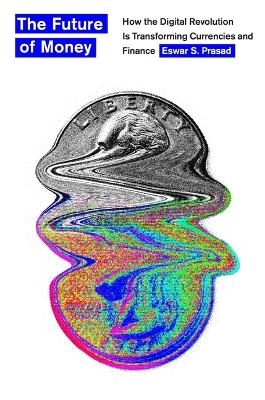
The Future of Money
How the Digital Revolution Is Transforming Currencies and Finance
Seiten
2023
Harvard University Press (Verlag)
978-0-674-29389-2 (ISBN)
Harvard University Press (Verlag)
978-0-674-29389-2 (ISBN)
New technologies are shaking the foundations of traditional finance. Leading economist Eswar Prasad foresees the end of cash, as central banks develop their own digital currencies to compete with Bitcoin and Meta’s Diem. Money and finance are on the verge of dramatic transformations that will reshape their roles in the lives of ordinary people.
An Economist Book of the Year
A Financial Times Book of the Year
A Foreign Affairs Book of the Year
A ProMarket Book of the Year
One of The Week’s Ten Best Business Books of the Year
“A road map for money managers, market strategists, and others seeking to understand this new world.”—Barron’s
“Money shapes economies, economies shape nations, nations shape history. It follows that the future of money is profoundly important. Here is a definitive report on where we are and where we are going.”—Lawrence H. Summers, former Secretary of the Treasury
“Prasad manages to make the financial system intelligible and interesting without resorting to shortcuts and exaggeration…Previous overhauls mainly improved existing systems, he notes. The end of cash—likely within a decade or two—is revolutionary.”—The Economist
The world of finance is on the cusp of a major disruption that will affect corporations, bankers, states—indeed, all of us. As Eswar Prasad makes clear, the end of physical cash will fundamentally rewrite how we live. Bitcoin, Ethereum, and other cryptocurrencies are just the beginning: spurred by their emergence, central banks will increasingly develop their own, more stable digital currencies. Meanwhile, cryptocurrencies themselves will evolve dramatically as global corporations like Meta, Apple, and Amazon join the game.
Prasad shows how these innovations will redefine the very concept of money, unbundling its traditional functions. This transformation promises greater efficiency and flexibility, but also carries the risk of instability, lack of accountability, and erosion of privacy. A lucid, visionary work, The Future of Money shows how to maximize the best and guard against the worst of what is to come.
An Economist Book of the Year
A Financial Times Book of the Year
A Foreign Affairs Book of the Year
A ProMarket Book of the Year
One of The Week’s Ten Best Business Books of the Year
“A road map for money managers, market strategists, and others seeking to understand this new world.”—Barron’s
“Money shapes economies, economies shape nations, nations shape history. It follows that the future of money is profoundly important. Here is a definitive report on where we are and where we are going.”—Lawrence H. Summers, former Secretary of the Treasury
“Prasad manages to make the financial system intelligible and interesting without resorting to shortcuts and exaggeration…Previous overhauls mainly improved existing systems, he notes. The end of cash—likely within a decade or two—is revolutionary.”—The Economist
The world of finance is on the cusp of a major disruption that will affect corporations, bankers, states—indeed, all of us. As Eswar Prasad makes clear, the end of physical cash will fundamentally rewrite how we live. Bitcoin, Ethereum, and other cryptocurrencies are just the beginning: spurred by their emergence, central banks will increasingly develop their own, more stable digital currencies. Meanwhile, cryptocurrencies themselves will evolve dramatically as global corporations like Meta, Apple, and Amazon join the game.
Prasad shows how these innovations will redefine the very concept of money, unbundling its traditional functions. This transformation promises greater efficiency and flexibility, but also carries the risk of instability, lack of accountability, and erosion of privacy. A lucid, visionary work, The Future of Money shows how to maximize the best and guard against the worst of what is to come.
Eswar S. Prasad is the Tolani Senior Professor of Trade Policy and Professor of Economics at Cornell University. He is also a Senior Fellow at the Brookings Institution, where he holds the New Century Chair in International Economics, and a research associate at the National Bureau of Economic Research. He is the author of Gaining Currency: The Rise of the Renminbi and The Dollar Trap: How the U.S. Dollar Tightened Its Grip on Global Finance.
| Erscheinungsdatum | 09.08.2023 |
|---|---|
| Zusatzinfo | 17 photos, 8 illus. |
| Verlagsort | Cambridge, Mass |
| Sprache | englisch |
| Maße | 156 x 235 mm |
| Gewicht | 567 g |
| Themenwelt | Sachbuch/Ratgeber ► Beruf / Finanzen / Recht / Wirtschaft ► Wirtschaft |
| Wirtschaft ► Betriebswirtschaft / Management ► Finanzierung | |
| Wirtschaft ► Volkswirtschaftslehre ► Finanzwissenschaft | |
| ISBN-10 | 0-674-29389-4 / 0674293894 |
| ISBN-13 | 978-0-674-29389-2 / 9780674293892 |
| Zustand | Neuware |
| Haben Sie eine Frage zum Produkt? |
Mehr entdecken
aus dem Bereich
aus dem Bereich
wie Künstliche Intelligenz und ihre Pioniere unser Leben und Arbeiten …
Buch | Softcover (2024)
Verlag Herder
CHF 25,20


